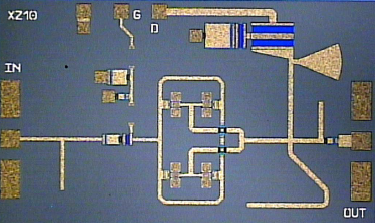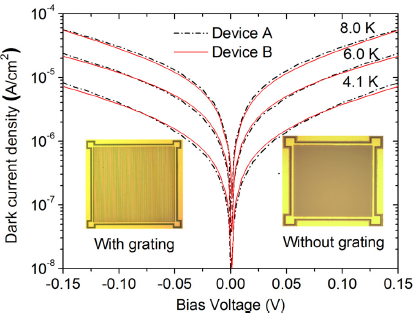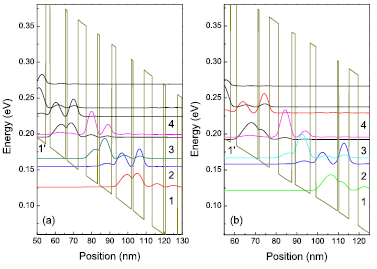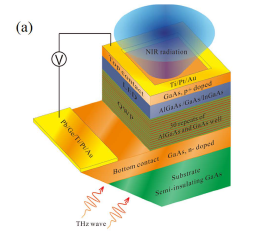-
09-06-2017
A W-Band Traveling-Wave Frequency Doubler With Output Power of 9 dBm and Power Efficiency of 11.2%
Abstract—An 85 to 110 GHz high efficiency, high output power frequency doubler is presented in this letter. The traveling-wave topology is used to generate even harmonics and suppress odd harmonics effectively. The output fundamental and 4th harmonic reflectors are applied to enhance the efficiency, conversion gain and fundamental rejection. The measured results show a peak conversion gain of 3.2 dB and peak efficiency of 11.2% with a saturated output power of 9 dBm at 100 GHz. The doubler exhibits higher than 30 dB fundamental rejection from 85 to 110 GHz with a compact chip size of 1.5 0.9 mm .[ Learn more ]
-
09-06-2017
Optical-phonon-mediated photocurrent in terahertz quantum-well photodetectors
Strong and sharp photocurrent peak at longitudinal optical (LO) phonon frequency (8.87 THz) is found in GaAs/(Al,Ga)As terahertz quantum-well photodetectors (QWPs). Two mesa-structure terahertz QWPs with and without one-dimensional metal grating are fabricated to investigate the behavior of such photoresponse peak. The experimental and simulation results indicate that the photocurrent peak originates from a two-step process. First, at the LO phonon frequency, a large number of non-equilibrium LO phonons are excited by the incident electromagnetic field, and the electromagnetic energy is localized and enhanced in the thin multi-quantum-well layer. Second, through the Frohlich interaction, the localized electrons are excited to continuum s...[ Learn more ]
-
09-06-2017
Transient energy relaxation in scattering-assisted terahertz quantum cascade lasers
We adopt a self-consistent Maxwell–Bloch method to investigate the energy relaxation process from unsaturated to saturated in the scattering-assisted terahertz quantum cascade laser. In the lasing-establishment process, more nonequilibrium LO phonons are accumulated and more electrons are thermalized. At the same time, more efficient energy relaxation of the saturated situation can be found compared with the unsaturated situation. These phenomena stem from the improved electron transport efficiency across the active region, due to the lasing-induced lifetime reduction of electrons in the upper lasing subband. The simulation results are qualitatively identical with previous experimental results. Published by AIP Publishing[ Learn more ]
-
09-06-2017
Frequency Up-Conversion Photon-Type Terahertz Imager
Terahertz imaging has many important potential applications. Due to the failure of Si readout integrated circuits (ROICs) and the thermal mismatch between the photo-detector arrays and the ROICs at temperatures below 40 K, there are big technical challenges to construct terahertz photo-type focal plane arrays. In this work, we report pixel-less photo-type terahertz imagers based on the frequency up-conversion technique. The devices are composed of terahertz quantum-well photo-detectors (QWPs) and near-infrared (NIR) light emitting diodes (LEDs) which are grown in sequence on the same substrates using molecular beam epitaxy. In such an integrated QWP-LED device, photocurrent in the QWP drives the LED to emit NIR light. By optimizing the s...[ Learn more ]
-
31-10-2017
Seismic targets classification using wavelet packet manifold in unattended ground sensors systems
ABSTRACT One of the most challenging problems in target classification is the extraction of a robust feature, which can effectively represent a specific type of targets. The use of seismic signals in unattended ground sensor (UGS) systems makes this problem more complicated, because the seismic target signal is non-stationary, geology-dependent and with high-dimensional feature space. This paper proposes a new feature extraction algorithm, called wavelet packet manifold (WPM), by addressing the neighborhood preserving embedding (NPE) algorithm of manifold learning on the wavelet packet node energy (WPNE) of seismic signals. By combining non-stationary information and low-dimensional manifold information, WPM provides a more robust repres...[ Learn more ]





